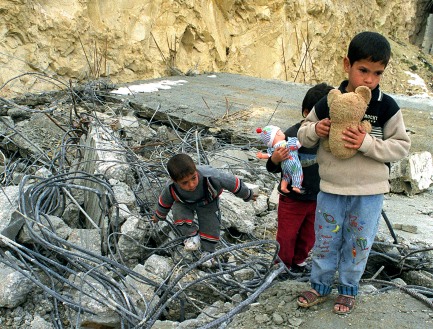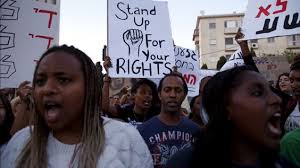The Israeli prime minister is anxious for the world to abandon perusing the two- state solution. Instead he is proposing to extend Israel’s full sovereignty over all of Palestine, its people, and resources. But will his one state option curtail or suspend Israel’s structural discriminatory practices, or end Israel’s military occupation of the Palestinian territories?
mai abdul rahman February 2017

The United Nations, European Union, Arab League, United States, Canada, Russia, Germany, China, the Vatican, as well as the majority of Israelis support the two-state solution. In fact, 138 nations endorse an independent Palestinian state within the pre 1967 Green Line borders. Nonetheless, Israel’s Prime Minister Benjamin Netanyahu is anxious for the world to abandon perusing the two-state solution.
President Donald Trump’s ambivalence on how best to pursue a permanent peace among Palestinians and Israelis may have facilitated Netanyahu’s public disclosure of the motive behind his government’s rabid focus on increasing the number of Jewish illegal settlements in the West Bank and East Jerusalem. While Netanyahu absolved his government of any political responsibility for Israel’s human rights and international law violations by blaming the occupied and oppressed Palestinians, he unveiled Israel’s intent to expand its borders and retain control over the entire Palestinian territories. Consequently, Israel’s illegal settlement scheme was employed to destroy the territorial integrity and contiguity of a future Palestinian State.
As a matter of fact, expanding Israel’s illegal settlements on Palestinian lands has been Israel’s Likud party platform since its inception. Netanyahu has been a Likud party member since the 1980’s and its elected party leader since 2005. Throughout his political career, Netanyahu was noted for his opposition to the peace accord agreement between the Palestinian Liberation Organization and Israel, which resulted in Israel’s brief withdrawal from the West Bank. While Netanyahu is credited with the rise of Israel’s extremists, his successive governments have shaped Israel’s occupation policies, settlement expansion in the West Bank and East Jerusalem, and Israel’s decade long Gaza siege and wars. 
Nevertheless, since 2009, Netanyahu issued several public statements in support of the two-state solution, which were understood as Israel’s preferred framework for permanent peace between the Israelis and Palestinians. So what forced Netanyahu to reveal his government’s coveted intent of expanding Israel’s sovereignty over the entire Palestinian territories? The mounting pressure exerted by the international community on the illegality of Israel’s settlement enterprise, and the global affirmative support for an independent Palestinian State based on the perimeters of the two-state solution.
Regardless, Netanyahu’s one state proposal is not a novel concept. After the assassination of Yitzhak Rabin and the subsequent rise and political dominance of Israel’s extremists, the Palestinians, Israelis and their respective supporters have considered two political frameworks. A measurable sum either advocated for adopting the one state option or the two-state solution. Although, the goals of the two frameworks are driven to meet identical objectives, the advocates of each proposed option aim to achieve divergent if not contradictory outcomes.
By and large, the Israelis and their supporters who advocate for the one state option are subscribers of Israel’s far right parties, funders, residents and leaders of Israel’s illegal settlements. Their aim is to absorb the Palestinians as second-class citizens with limited rights. They argue, increasing the Jewish population in the Palestinian territories will be less complicated and internationally accepted if Israel extends its sovereignty over the entire West Bank and East Jerusalem. This will nullify Israel’s legal constrains of transferring its own population into the Palestinian lands it military occupies and expand Israel’s borders from the shores of the Mediterranean Sea to the West Bank of the Jordan River.
Meanwhile, the Palestinians and their supporters who advocate for one state option are grounded on the principles of human values, democracy, international covenants and laws, and the fundamental human rights doctrine. They believe the one state option will offer the Palestinians the legal framework to advocate for equality and justice for the entire ethnic and religious groups that live within Israel including the Palestinians. In addition, it will provide the Palestinians the opportunity to forge alliances with Israel’s various Jewish ethnic communities (African, Arab, and non-European Jews) and Israel’s non-Jewish citizens who are also struggling under Israel’s exclusive social and political construct. They argue that Israel’s established differential treatment and embedded institutional bias of Jewish and non- Jewish citizens will eventually usher mandatory international embargo of the Israeli State. To secure full citizenship rights for Israeli citizens whether they may be Palestinians, or Israeli black Ethiopian Jews, or oriental Mizrahi Jews, they rely on the legal framework of the Apartheid Convention, International law, and the Global Boycott, Divestment, and Sanctions (BDS) movement.
They argue that Israel’s established differential treatment and embedded institutional bias of Jewish and non- Jewish citizens will eventually usher mandatory international embargo of the Israeli State. To secure full citizenship rights for Israeli citizens whether they may be Palestinians, or Israeli black Ethiopian Jews, or oriental Mizrahi Jews, they rely on the legal framework of the Apartheid Convention, International law, and the Global Boycott, Divestment, and Sanctions (BDS) movement.
Mind you, both of these camps -whether supporters of an exclusive theocratic Israeli political system, or those who advocate for an inclusive social and political Israel- believe their strategy will eventually succeed. While one aims to nullify the illegality of the Israeli occupation policies and extend Israel’s borders, the other wants to use internationally accepted fundamental human values and rights to reform Israel’s social and political institutions.
The two state advocates also bear distinctly different objectives. Israelis and their supporters who advocate for the two- state solution aim to protect the Jewish character of the Israeli State and evade the prospect of it becoming an apartheid state. They argue that Israel’s continued military occupation of Palestine and settlement expansion policies will force the international community to intervene on behalf of the Palestinians and pressure Israel to adopt inclusive democratic standards and norms, which would dilute its national character. They fear such a prospect could alter the exclusive protections and privileges that Israeli Jewish citizens and prospective Jewish immigrants have been afforded.
Palestinians and their supporters who advocate for the two- state solution want to end Israel’s terminal occupation of the Palestinians and their lands. Whereas they have succeeded in creating massive political support for the future establishment of an independent Palestinian State, Israel’s illegal settlements continued to grow. As a result they have urged the boycott of Israeli settlement products, the divestment from companies that operate within Israel’s illegal settlements, and the sanction of companies that profit from the Israeli military occupation. They argue, once free of Israel’s military occupation, Palestinians can begin building their economy, address their immediate need for water, electricity, clean up their polluted streams and environment. They support the two-state solution to provide the Palestinians the freedom and space to begin building their national institutions, infrastructure, and economy, address their decades long high unemployment and poverty rates, and improve their quality of life.
In the meantime, it has become clear as day that as long as Netanyahu is the prime minister of Israel he intends to retain control of the Palestinians, their lands, and resources. In addition, the state of Israel and its institutions give precedence to its Jewish citizens over others, and the operational and legislative tools to ensure Palestinians are without the political and social means to demand full equality under the law.
Notwithstanding, if Israel with the help of the Trump administration impose the one state option on the Palestinians, the illegality of Israel’s settlements under international law would be revoked. Consequently, Israel’s human rights violations against the Palestinian population will be become an internal issue- but not indefinitely.
So what could the Palestinians achieve by acquiescing to Netanyahu’s proposed one state option? Extending Israel’s sovereignty over the Palestinian territories will not end Israel’s mass displacements of the Palestinians, or alter Israel’s structural and institutional exclusive laws, and will also briefly limit Palestinian access to international forums to call attention to their plight. However, the one state option may offer the Palestinians the strategic leverage to partner with Israel’s marginalized populations to demand full citizenship rights from within Israel’s political and legal construct, and the legal standing to invoke the International Suppression and Punishment of the Crime of Apartheid Convention.